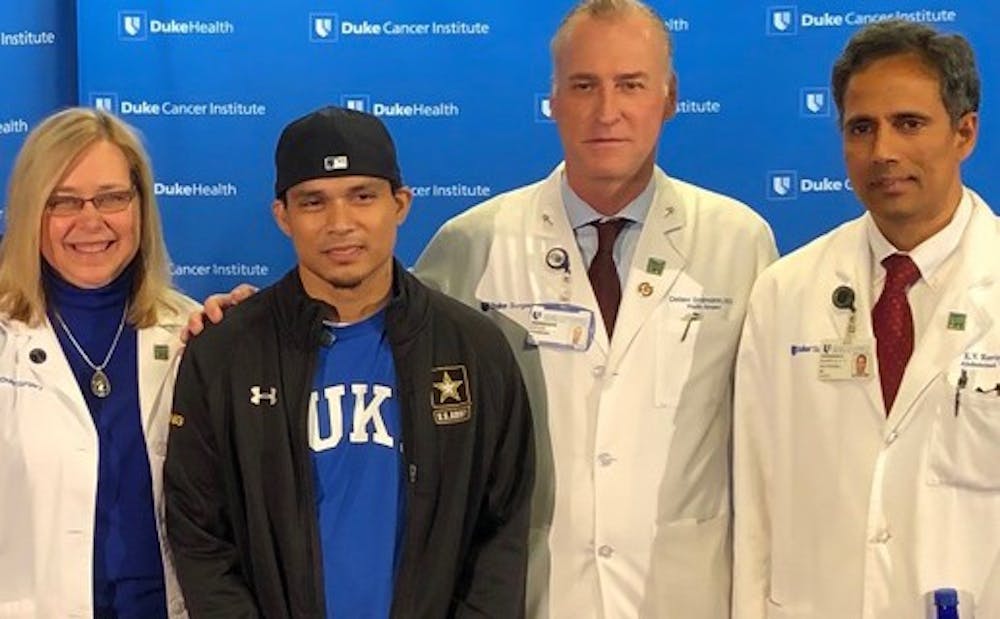Army veteran Johnathon Nauta was told to spend his final days in hospice—until Duke surgeons performed an abdominal wall transplant for the first time in North Carolina's history and saved his life.
The former Army drill sergeant from Fayetteville experienced an appendix burst when he was 6 years old. The resulting scar tissue caused three life-threatening intestinal blockages.
When the now 37-year-old veteran was admitted to Duke in 2014, he was unable to eat and depended on tubes and waste bags for four years. Nauta’s severely damaged bowels were leaking intestinal content onto his abdominal wall, the flap responsible for protecting organs within the abdominal cavity.
“I tried to be hardcore, but I couldn’t keep anything down, so I checked myself into the hospital,” Nauta said Thursday at a news conference at Duke.
The Duke Hospital eventually performed abdominal wall and bowel plant surgery surgery earlier this year. Nauta was the first abdominal wall transplant recipient in North Carolina and surrounding states.
The surgery required 14 hours and a team of 25 doctors, nurses and staff and it saved Nauta's life.
The Duke Hospital knew what Nauta needed when he was stabilized initially in 2014: an abdominal wall transplant.
The crux of the issue was that he needed the simultaneous transplantation of both the abdominal wall and intestines, as his original abdominal wall was too severely compromised to cover up new bowels.
While Nauta would wait four more years for the transplantation surgery, a team of Duke doctors including Detlev Erdmann, plastic and reconstructive surgeon, and Kadiyala Ravindra, abdominal transplant surgeon, strategized the surgical plan.
The challenge lay in the limit of existing experience and knowledge surrounding the procedure.
“The transplant fell under a subsection of transplants called Vascularized Composite Allotransplantation (VCA)," Ravindra said. "The VCA is a relatively new transplant. Less than 30 cases of abdominal organ and wall transplantations had been done around the world."
Ravindra and Erdmann worked closely with Debra Sudan, chief of abdominal transplant surgery.
In 2017, a visiting professor from the University of Oxford, a leader in abdominal wall transplantations, provided Ravindra and Erdmann extensive education about the procedure.
Pressured by the time constraints of both of Nauta's necessary transplant surgeries, team also sought to incorporate a novel technique that would allow the restoration of blood flow—by creating a separate source through the abdominal wall to a blood vessel connection in the groin—within a shorter and safer time frame.
“We found a way to restore blood supply to the graft [meaning transplantation tissue] that has never been done before,” Erdmann said.
On average, 20 transplant candidates die each day waiting for an organ, but Nauta was fortunate enough to find one. Within a week of Nauta being activated on the bowel and abdominal wall transplantation lists, a suitable donor was found.
The donor, Marcus Scales, was a 13-year-old boy from North Carolina who died Oct. 10 due to undisclosed cause.
“I was relieved that we were offered organs from a donor that appeared to be a perfect match,” Sudan said.
The successful surgery gives hope to other patients in need of similar procedures.
“There are many more patients in Mr. Nauta’s scenario, where doctors and patients don’t know what to do. So patients are told, 'Sorry, we can’t help you'," Erdmann said. "So we have a solution for these patients, which is an organ transplantation simultaneous to an abdominal wall transplantation."
Get The Chronicle straight to your inbox
Sign up for our weekly newsletter. Cancel at any time.
Beyond overcoming an almost unprecedented medical challenge, the team of Duke doctors is very pleased with the surgical outcome on a personal level, too. Almost two months after the surgery, Nauta has now fully recovered.
“Because I had already known this patient for four years, and he’s had so many complications, we’ve known him so well. He was suffering, being a young guy with two kids, so it was really heartbreaking,” Ravindra said. “It was really rewarding to see him eating regular food now and out of the hospital.”

